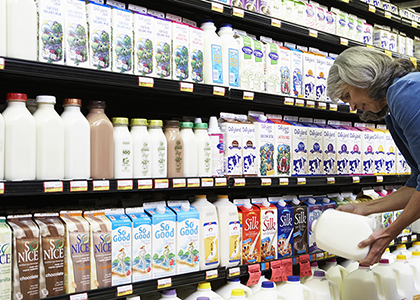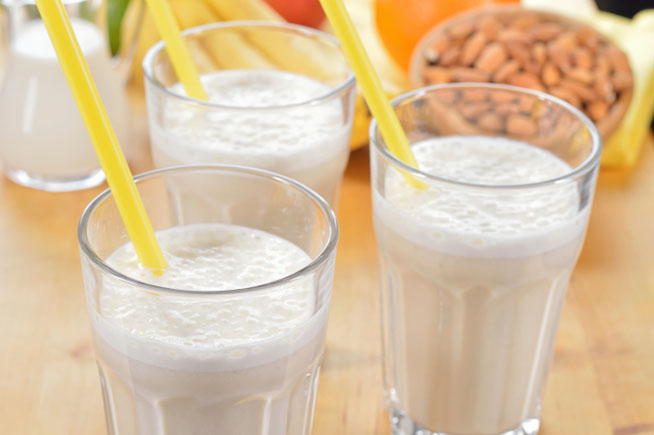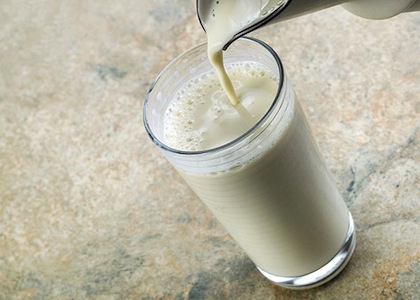
Dairy vs. Non-Dairy Milk
By Isabel Smith, MS, RD, CDN
With so many different types of milk out there to buy, it can often be confusing to make a choice of which one to purchase. To help you navigate both dairy and non-dairy milks, we have compared the nutrients in a few popular milks and provided tips to help you make smart and healthy choices at the checkout line.
The milk off starts here!
Skim Milk
Pros:
- All-natural, (in most cases) no or few additives
- Good source of calcium meeting about 30% of daily recommended intake
- Source of potassium that’s heart-healthy and a key electrolyte for the body
Cons:
- May contain hormones or antibiotics (when not organic)
- Contains more calories than non-dairy soy, almond and coconut milks
- May cause stomach discomfort for some
Tips for purchase:
- Purchase organic (this goes for all dairy products)
- Stick to skim milk for most dairy milk consumption whenever possible
Nutrition breakdown per 8 oz:
- 90 calories
- 0 g fat
- 130 mg sodium
- 12 g sugar
- 8 g protein
- 300 mg calcium
- 400 mg potassium
Almond Milk
Pros:
- Lower in calories than cow’s milk

- Contains the same (if not more) calcium than regular milk when fortified (note: almond milk made at home will not have the same amount of calcium). Learn more about Dairy Alternatives that Give You Calcium.
- Fewer grams of carbohydrates than regular milk
- May have other added fortified nutrients like Vitamin D and B12 (read the nutrition label)
- Offers heart-healthy, unsaturated fat from the almonds
Cons:
- May have added chemicals like carrageenan that can be a mild irritant to gastrointestinal tract
- Can contain extra added sugars if not purchasing unsweetened
- Contains fewer grams of protein than cow’s milk
- May contain fewer milligrams of heart-healthy potassium than cow’s milk
Tips for purchase:
- Look for unsweetened varieties
- Opt for brands that contain no carrageenan (or other ingredients that cannot be pronounced) as an ingredient
Nutrition breakdown per 8 oz:
- 30-40 calories
- 2.5-3 g fat (0 g saturated fat)
- 160-180 mg sodium
- 190 mg potassium
- 2 g carbohydrates
- 1 g dietary fiber
- <1 g sugar
- 1 g protein
- 300-400 mg calcium
Soy Milk
Pros:
- May contain as much calcium as regular milk (when fortified)
- Offers almost as much protein as regular milk that can help promote fullness and satiety
- Offers more heart-healthy potassium than almond milk
- Contains heart-healthy, unsaturated fat from the soybeans
- May contain other nutrient additives like B12 and iron depending on the brand
Cons:
- May contain GMO’s
- May contain artificial ingredients like carrageenan and sugars depending on the brand and variety
- Contains more calories than almond milk
Tips for purchase:
- Choose organic/ Non GMO whenever possible
- Read labels well and choose varieties without carrageenan
- Purchase unsweetened variety whenever possible
Nutrition breakdown per 8 oz:
- 80 calories
- 4 grams fat (0 grams saturated fat)
- 110 mg sodium
- 280 mg potassium
- 3 g carbohydrates
- 1 g fiber
- 1 g sugar
- 7 g protein
- 300 mg calcium
Coconut milk
Pros:
- Contains fewer calories than both cow’s milk and soy milk
- May contain other added nutrients like Vitamin B12 and Vitamin D (depending on the brand)
- Contains more potassium than some other non-dairy milks like almond milk (in some cases)
- Often creamier than some of the other non-dairy milks including almond milk
Cons:
- Contains more fat and more saturated fat (although it is from plant-based source) than cow’s milk and than some of the other non-dairy milks
- May contain artificial and added ingredients including carrageenan and flavors
- Contains less protein than soy milk and regular cow’s milk
Tips for purchase:
- Purchase the lower-calorie versions in tetra-paks instead of purchasing canned varieties that are higher in calories
- Choose unsweetened coconut milk that is also free of carrageenan
Nutrient breakdown per 8 oz (boxed unsweetened, not canned):
- 45 calories
- 3.5-4 g fat
- 1-4 g saturated fat
- 0-130 mg sodium
- 40-180 mg potassium
- 2 g carbohydrates
- 1 fiber
- 0 g sugar
- 1 g protein
- 0-100 mg calcium
General tips for purchasing both non-dairy and cow’s milks:
- If you’re someone looking for calcium in their dairy/non-dairy milk, cow’s milk automatically contains calcium, but when it comes to non-dairy milks, make sure it has added calcium (they are not always fortified)
- Purchase non-GMO/organic whenever possible (especially with cow’s milk and soy milk)
- For non-dairy milks, choose those that are unsweetened, and without carrageenan and other ingredients on the label that you cannot pronounce
Or, if you want to make your own non-dairy milk, give it a try! Here’s a few recipes…
(Note: These recipes may contain more calories than those mentioned above)
- Homemade Coconut Milk

- Creamy and Sweet Coconut Milk
- Cinnamon Hazelnut Milk
- Cinnamon Vanilla Almond Milk